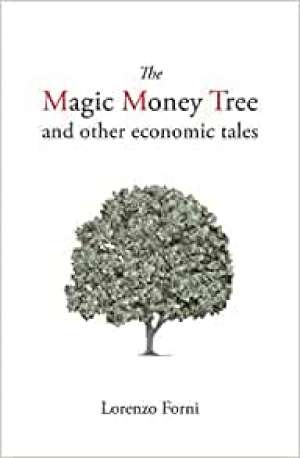29 November 2021
The Magic Money Tree
and Other Economic Tales
Lorenzo Forni
2021, Agenda Publishing Company, 184 pages,
ISBN 9781788213646
Reviewer: Bridget Rosewell

The author is an economic policy maker in the macroeconomic sphere, with a career at the IMF and the Central Bank of Italy as well as in academia and consultancy. He is clearly annoyed at what he sees as a failure to grasp economic reality by politicians and commentators and this book is the result.
In summary, he partly but not entirely, succeeds. I think this book will be useful for students doing macro courses since it comes from a practitioner and includes case studies and cautionary tales. It will also be useful to those of us who are committed to explaining economic reality to those who wish to argue that there are no constraints to policy options. I’m not so convinced that it will convince those who do not wish to be convinced. Of course, that is an enormously difficult and perhaps impossible thing to do but would need language that is more anecdotal to have a chance. The author is embedded in ‘traditional’ macro policy making and it shows.
His main focus in this short book is to explain and document the existence of budgetary and indebtedness constraints. The underlying performance of the economy rests on its productive potential and all macro policy can do is stabilise not create growth. Printing money is not a substitute for education, research and innovation. This is, in my view, absolutely true. I would, however, like to have a clear argument to deal with those who think that printing money to pay a nurse to work in the health service is a valid economic policy. At what point does this cease to work? Does it ever work? Implicitly, he argues that it does work when there is spare capacity but not afterwards.
This raises the tricky question, which is not addressed, of what constitutes spare capacity. Long years ago, when I was a member of the then Chancellor’s group of ‘wise men’ (!), we undertook a study of the output gap. My final conclusion was that the definition was extremely wobbly and precision impossible. I’d have liked some discussion of this issue.
About half the book looks at the budgetary constraint, in terms of the capacity of the economy to deliver goods and services. It uses the example of Belarus to examine what happens when government tries to expand credit to enable higher standards of living and produces an unsustainable trade problem as a result. An important theme is that dealing with the aftermath of unsustainable policies is much more painful than the consequences of preventing such policies in the first place. Moreover, the pain of that aftermath falls more heavily on the poorer parts of society.
The other half of the book concentrates on the debt constraint and whether it can be avoided. A lengthy section deals with the consequences of repudiating debt and where the impact of this is likely to be felt. It concludes, with the example of Argentina, that the subsequent impact of higher interest rates and capital flight again outweigh the possible advantages. Forni is not, however, against some aspects of debt restructuring when required, and believes that this will be necessary in some poorer countries as the impact of the pandemic recedes.
Forni’s main target is the politicians who, in targeting their short-term advantage, undermine the medium and long-term prospects for their countries. It’s a tempting target but countries with less frequent or non-existent elections do not appear to be immune. While he (correctly) argues that credit and the banking system are core to improving economic performance and living standards, credit is a ‘magic potion’ that can be drunk to excess. China may well be facing into just such a position currently.
The magic money tree is, on this analysis, a fragile plant whose roots are shallow and which easily becomes weakened when it grows too fast. A healthy tree requires careful nourishment and a strong root system if it to grow successfully. I will resist the temptation to diverge into a discussion of the merits of tree planting on vast scales without consideration of their prospects, although it is hard and the analogy strong.
SPE members who need to find support for economic rationality in dealing with their clients, masters, or even the friends in the pub will find useful material in here. It might need a bit of humanising though.
